Journaling to Overcome Emotions of Cancer
Journaling and expressive writing can improve the lives of cancer patients. Several scientific studies have shown that journaling can improve sleep, pain levels, other general physical symptoms, psychological well-being and overall quality of life for cancer patients. Expressive writing has also been shown to reduce the number of trips to the oncologist.
But there is so much more! Let’s explore this further…
Expressive Writing Tames Our Emotions
Facing a cancer diagnosis is one of the most difficult experiences in life. Our emotions can and definitely do run amok. It can be very hard to process them. Those emotions are usually overwhelming and tough to deal with. Writing things down can help us calm our emotions.
Putting our emotions down on paper allows us to distance ourselves a little. It allows us to stand back and observe what is happening. Logging the events of the day succinctly, truthfully and without blame or judgement may detach us from the harshness of the emotions that are associated with them.
Journaling Puts Things In Perspective
Writing down our thoughts can help us reflect on the events of the day. It can help us sort out daily life hassles, like getting stuck in traffic. This allows our brains the room to focus on bigger issues or setbacks that need our attention at that moment.
Looking back at our emotions during the events of previous days can also help shed light on our responses that occurred more recently. For example, yelling at the elevator because it is too slow to arrive to your floor really doesn’t make a lot of sense. But then you read and remember that a few days ago your doctor switched your medications. Now, being angry may make more sense. It could be a side-effect of your new medications.
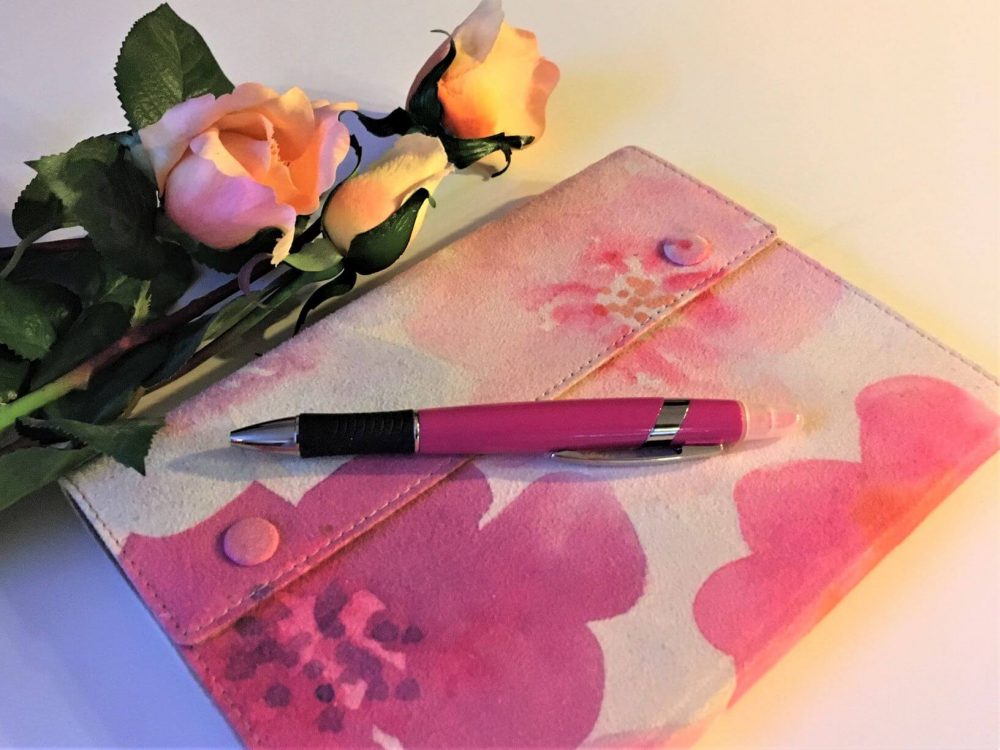
Journaling Can Be A Form of Meditation
Mindful meditation is a process of training our minds to live in the present, not worrying about the future or fretting over the past. So, writing down haunting thoughts of the past or future can free us to focus on the current moment.
Writing thoughts in the moment can also help us focus in the present. For example, try this… prompt your writing session with “In this moment, I feel…”. Then write continuously for 10 minutes with a stream of thoughts about how you feel in this time frame.
In fact, writing in a journal by hand, pen on paper, stimulates our brain centers in much the same way that meditation does. So, just as meditation relaxes us and relieves stress, so does journaling and expressive writing.
Writing Things Down Helps Us Think Them Through
A cancer diagnosis creates an emotional turmoil. Anger, sadness, worry, fear, doubt and anxiety are just some of those emotions that hit us all at once. Negative thoughts and feelings get mixed up, intertwined and convoluted. It can be a real mess of a situation. And it can be hard to sort through all that to find a clear path to deal with it all. Writing those thoughts down can help us process them. It can help us gradually unwind the knots and kinks in our minds. Eventually the path smooths out and we can again focus on the road ahead of us.
Journaling Records Our Struggles And Triumphs
Knowing we have overcome a struggle gives us a sense of pride and strength to carry forward. We tend to forget how far we have come. Revisiting those triumphs can give us strength and hope that we can keep moving forward.
For example, looking back through a written record of our cancer treatments can help us deal with future treatments.
I had particularly nasty side-effects to my FEC combination chemotherapy. I was nauseated for days. And I dreaded each and every dose of that wretched stuff. But I wrote down how I was feeling on my first round and, looking back, I could see that the second day was the worst of it. If I could just make it through and beyond that second day, I knew I was on the home stretch. I could do it. It gave me strength and hope to make it through the next dose.
A Journal Keeps Our Thoughts In One Place
I write a lot of different things in my journal. I have quotes, thoughts, poems, dates, ideas, and events. I’ve even kept a journal for weight loss. It is a mishmash of things that just pop into my head from time to time. But it is all there, in one place, for me to look up whenever I need to.
In my world that is chemo-brain and forgetfulness, it is good to have it all in one place where I know I will find it. I write it all down there for safe keeping.
A Diary Can Become A Friend
Cancer can be lonely. It is a long process of ups and, mostly, downs. In the beginning, most cancer patients feel the love and support of friends and family, as they start to process emotions and begin treatments. But many people tend to tire of hearing about our treatment side-effects, worries and fears. These once supportive people start to feel the effects of all the long drawn out negative stuff that comes with a cancer diagnosis. They burn out.
I don’t blame them. It is a depressing situation. All the sickness, side-effects and negative emotions are draining. I can certainly understand why they don’t want to be around us. It’s tough to deal with. Those people that do stick around are true heros.
But, it is, unfortunately, very common to hear about cancer patients feeling abandoned and alone mid-way through treatment.
So, journaling and telling your deepest darkest secrets to your diary can help combat the loneliness. Your journal can become your best friend to help ease the loneliness.
Many people name their journals. Anne Frank called her diary “Kitty”. It gave her someone to talk to, as she felt she never had a true friend.
A Journal Can Keep Track Of Your Medical Journey
Some people use a journal to keep track of their medical appointments, tests and medications. Some will write down any side-effects of the medications they are taking.
I kept this all in a binder, separate from my diary. But in essence, it was a form of journaling that helped me through my treatments.
Writing Things Down Helps Us Remember What To Tell Doctors
Keeping track of medical information, including medication side-effects experienced, can help your oncologist determine next steps. Knowing that you had a particularly bad reaction to a certain medication may prompt your doctor to prescribe a different one that you may tolerate better. Knowing how much pain or fatigue you are experiencing day to day can also help determine what medications you may need or not need. Your doctor can use this information to fine tune your treatments.
Expressive Writing Promotes Self-Healing
A study done by the University of Kansas found that people who journal their thoughts and emotions had significantly fewer doctor visits for cancer related issues. Expressive writing can also lower our perception of pain. There are physical healing benefits, as well as emotional and psychological assets. Journaling can help us improve our memory, reduce stress and heal.
How to Journal
1. Pick your medium for journaling
There are many forms that a journal can take. Not all of them are writing. Some people do audio recordings or video too. Here is a list of some ideas to get you started.
- Paper Diary
- Electronic Diary
- Private Facebook Page or Group
- Blog Website
- Audio recordings
- Video journaling or vlog
Personally, I like to write by hand. I find my thoughts flow best when I put pen to paper. There is some science to back me up too. Handwriting stimulates the creative side of the brain. Stephen King, J.K. Rowling and Ernest Hemingway have written entire books in longhand.
2. When to write
You can commit to writing daily or just when you need to put your thoughts down. There is no perfect time. You can create a schedule with dedicated time written into your calendar. Or you can take your journal with you whereever you go and just write when the mood strikes you.
I keep a notebook with me at most times. I write down whatever idea pops into my head in the moment.
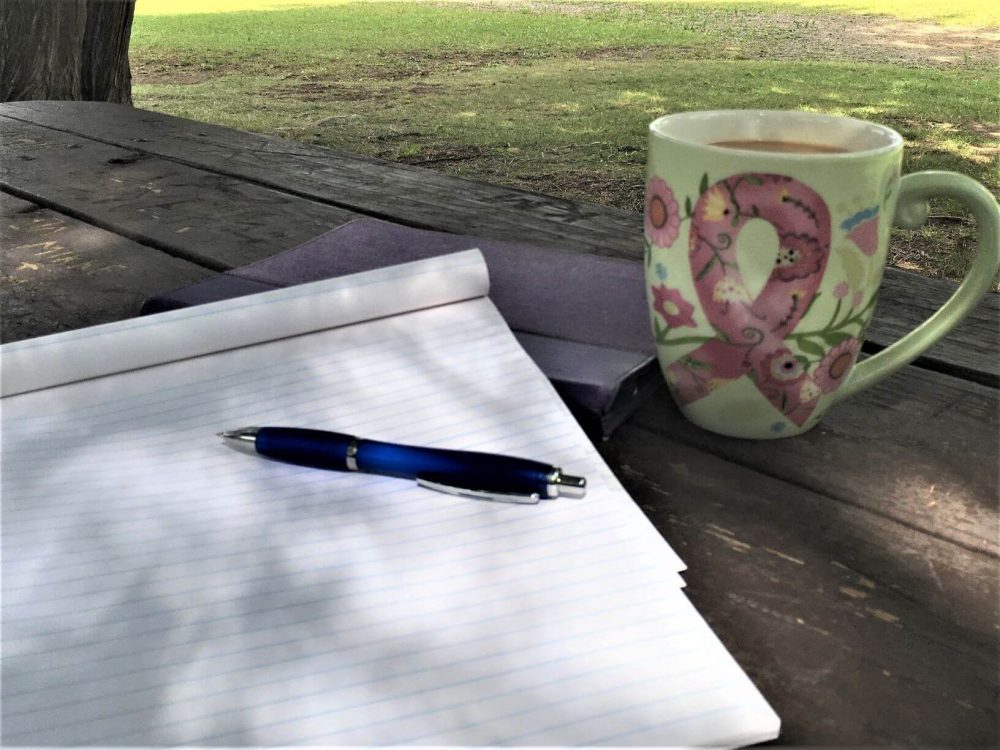
3. Where to write
I like to find a quiet space where I am alone with my thoughts. However, I have done some great writing in coffee shops, restaurants and busy airports. My favorite place to write is at a picnic table out in the calm and peaceful wilderness on a warm sunny day.
Find a place that makes you feel comfortable and happy.
4. How to start writing
Date your entry. Trust me, don’t skip this step. It will come in handy later when you look back over your entries.
Some people write by answering a question or prompt. Perhaps try these prompts:
- “Today I am thankful for….”
- “In this moment, I am feeling….”
- “Yesterday, I noticed…”
- “I am excited about…”
Some start the classic way with “Dear Diary”. Some start with simply “Hello”. You can start with whatever you feel will help you write.
5. What to write
Just write whatever comes to mind. You can write what you did that day, how you are feeling, or what you plan to do tomorrow. Some people will write down quotes or excerpts from books. Write what makes you happy or what you are looking forward to.
Don’t worry about grammar, spelling or formatting. Just write. Let it all flow out. If you want others to read it, you can always go back and edit later.
Your writing doesn’t even have to be complete sentences. Just jot down words or bullet points. You could make a list, write a letter or tell a story. Some people write poetry.
It doesn’t have to even be words. Drawing a picture to express your thoughts can help just as much. They say a picture is worth 1000 words. So, draw if the mood strikes you.
Your journal can be anything you want it to be. It doesn’t even have to be the same thing every day.
My journal is a mishmash of writings, mostly my own words, some quotes by others and some pictures I have drawn.
6. How long to write
This should be however long you want or need to write. If you don’t have a lot of time, set a timer and write for 5, 10 or 15 minutes. Some people will write one sentence a day. It all depends on you and how much time you have. You can make it work with your schedule any way you see fit.
Your Journey Is Your Own
Some people don’t want to keep a journal. That is fair enough. Perhaps they don’t want to keep a record of what is happening to them or around them. They may just want to forget. Writing may be a chore for some. They may not enjoy writing. And, of course, this is all perfectly okay.
Our cancer journeys are our own. We cannot travel down anyone else’s path. We all have our own outlets for dealing with this devastating disease. But if you are struggling to come to terms with it. If you need something to help you sort out your thoughts, maybe you could try to write them down. It has helped so many. It has helped me. Maybe it will help you?
I hope journaling helps you!
If you are struggling to come to terms with your emotions, don’t hesitate to seek professional help. Many cancer centers have support services, psychologists and counselors. There are cancer support groups that can help you talk things through as well. This disease is so difficult. It is one of the most devastating things we face in life. There are people out there trained to help you. Ask your oncologist or medical support team.
Read more about healing minds here at Pink Ribbon Runner.
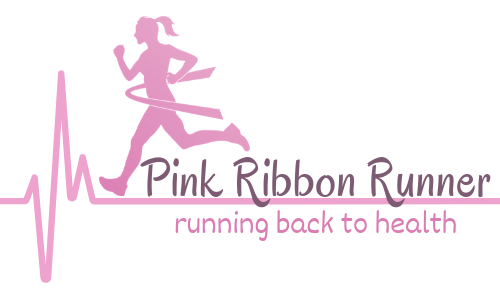
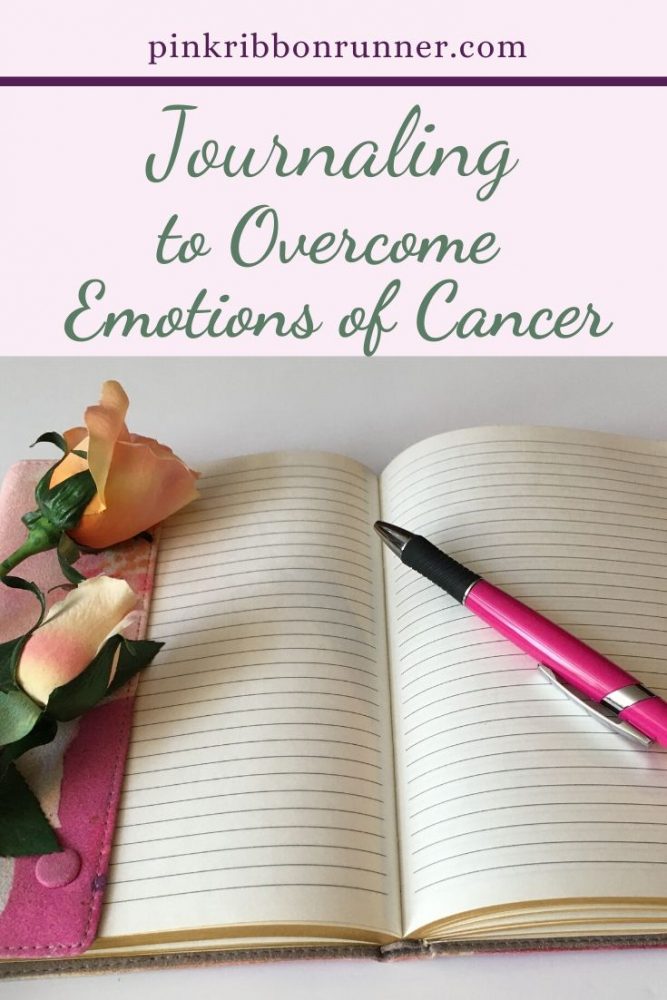
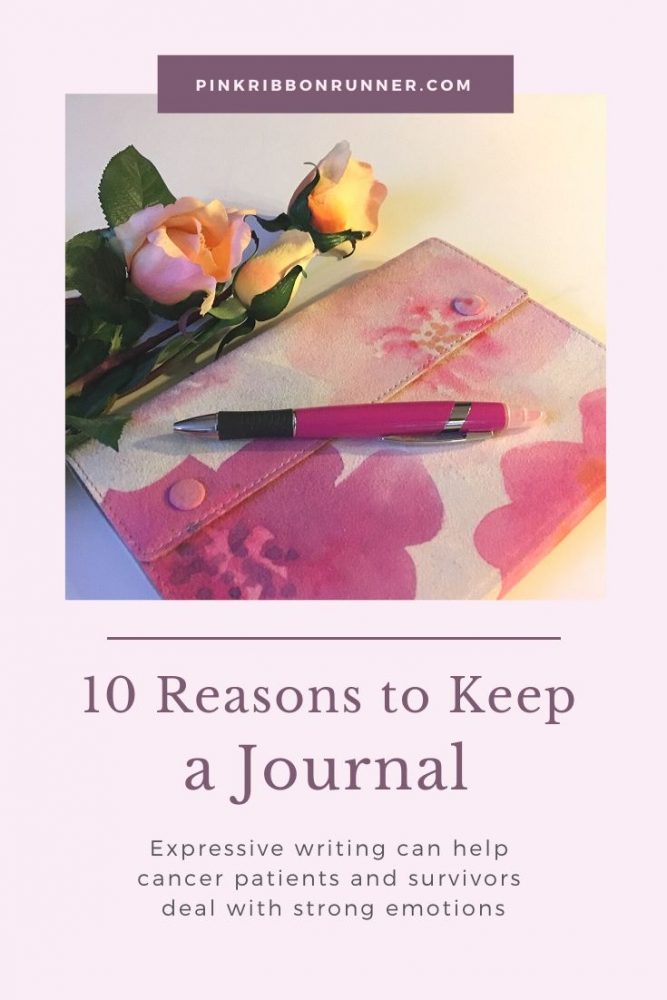



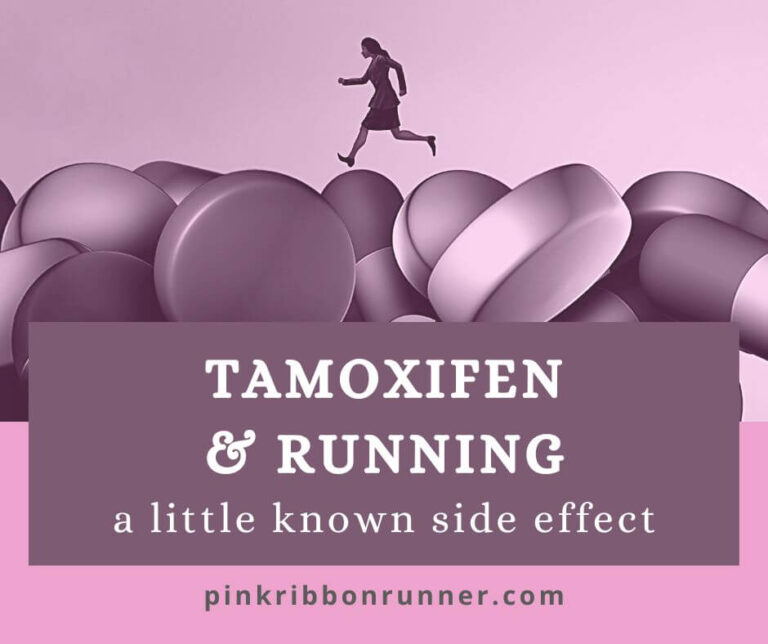
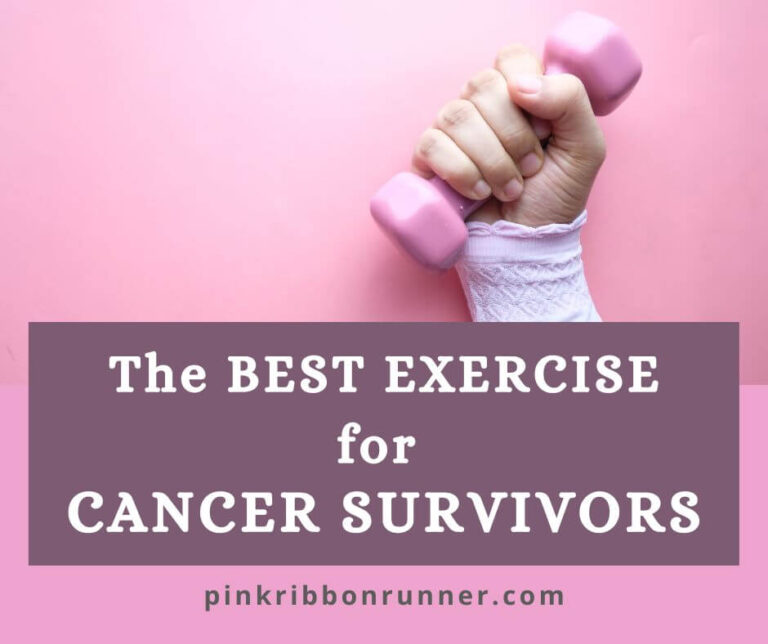
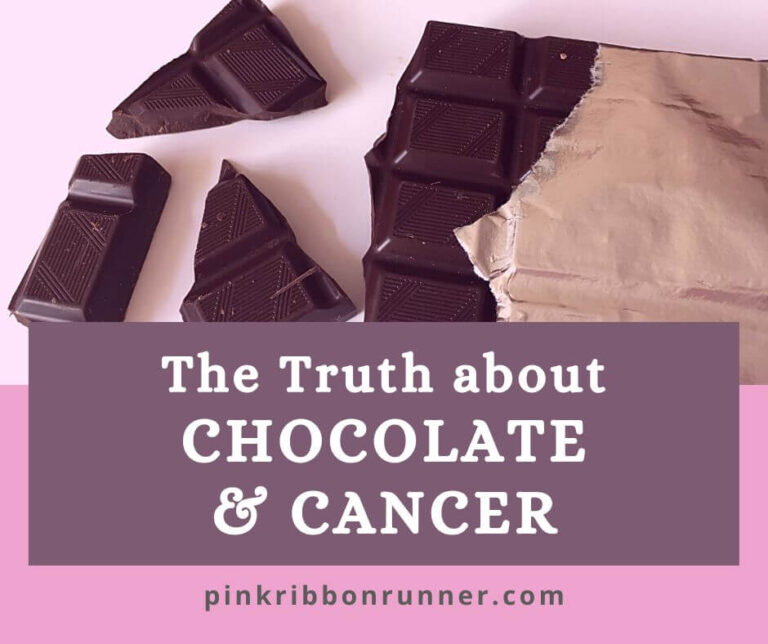

I have a journal but I do not write daily. Sometimes things just do not happen worth mentioning. What do you recommend about those days?
Your journal is your own. Don’t feel obligated to write everyday. Write when the mood strikes you. If you want to write everyday, but can’t seem to get going, put it in a calendar. Set aside a specific time in your day, perhaps 10 minutes, to write. Write down whatever comes to mind, even if it doesn’t seem exciting or important. What you had for breakfast. What someone said to you. Who you saw that day. Who you talked to on the phone. It may not seem important today, but it could be important later in life.
I don’t have cancer, but I do journal every day. It helps me clear my head, sort through my feelings and overall feel better. It is great therapy.
It is great therapy for anyone, you are right. I journaled before I had cancer too. It is a great way to think things through. Congratulations on journaling everyday! That is fantastic. It takes commitment to do that.
I LOVE this idea. I’m a pharmacist and I work with cancer patients. I’ve had patients who keep a journal of their side effects and it’s really helpful for me to help them navigate through their symptoms. But through your post, I can see that journaling is also really helpful with other things too such as a form of meditation and self-healing.
Thank you for taking the time to comment. Yes, journaling can be very helpful with self-healing.